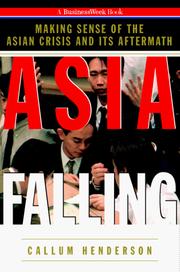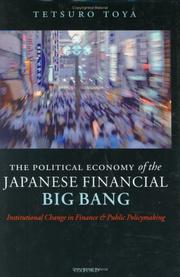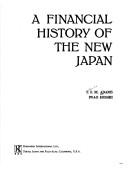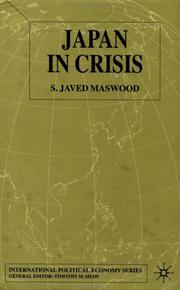| Listing 1 - 10 of 34 | << page >> |
Sort by
|
Book
ISBN: 9780198865025 0198865023 Year: 2020 Publisher: Oxford Oxford University Press
Abstract | Keywords | Export | Availability | Bookmark
 Loading...
Loading...Choose an application
- Reference Manager
- EndNote
- RefWorks (Direct export to RefWorks)
The second half of the nineteenth century is correctly known to have culminated in the emergence of the gold standard as the first truly international monetary regime. The processes leading up to this remarkable feat are, however, far less documented or understood. Economic historians have only recently started digging into the causes behind the 'fall of silver' that preceded the scramble for gold. It is nowadays clear that its effects were felt worldwide. Not in the least, silver depreciation severely affected East-West trade. It was, among other factors, behind the bankruptcy of several powerful institutions as the Oriental Bank Corporation. Yet at the same time, it cemented the position of other banks, some of which exist until this very day (HSBC, Standard0Chartered). What did these banks know that others did not?0In Accounting for the Fall of Silver, Michael Schiltz explains that the 1870s and 1880s witnessed furious experiments with new financial products and, equally important, strategies for hedging exchange rate risk. Drawing on archives that have never been used before, the book throws new light on an important episode of nineteenth century world history. At the same time, it illuminates lesser known aspects of the first gold standard period. It draws attention to the existence of 'carry trades' between European money markets and the lesser liquid Asian periphery; and describes the creation of financial contracts with the sole aim of enabling commodity finance among Asian mercantile centers.
J4562 --- J4560.70 --- Japan: Economy and industry -- finance -- money --- Japan: Economy and industry -- finance -- history -- Kindai (1850s- ), bakumatsu, Meiji, Taishō --- Money. Monetary policy --- Economic conditions. Economic development --- anno 1800-1899 --- anno 1900-1909 --- anno 1910-1919
Book
ISBN: 0691034516 1400812267 9781400812264 9781400821556 140082155X 9780691034515 128275212X 9786612752124 9781282752122 Year: 1994 Publisher: Princeton, N.J. Princeton University Press
Abstract | Keywords | Export | Availability | Bookmark
 Loading...
Loading...Choose an application
- Reference Manager
- EndNote
- RefWorks (Direct export to RefWorks)
Through a detailed account of the political battles over Japanese tax reform during the last two decades, Junko Kato draws an unconventional portrait of bureaucratic motivation, showing how fiscal bureaucrats exploit their unique technical knowledge to influence policymaking. Rejecting the notion that the monopolization of policy expertise leads to bureaucratic domination, Kato contends that bureaucrats seek to increase their influence upon politicians by strategically sharing information. She also explores the reason for the relative strength of the bureaucratic organization in comparison to the governing party, whose interest in reelections and intra-party politics may pose dilemmas for individual politicians.In 1989, the Japanese Diet enacted a broad-based consumption tax after two failed attempts and in the face of widespread public disapproval. Its passage was all the more remarkable for coming just as a series of dramatic financial scandals had begun to undermine popular support for the ruling Liberal Democratic Party, fore-shadowing its fall from power four years later. Kato argues that skillful maneuvering by the Ministry of Finance, determined to ensure stable long-term revenues, was decisive in persuading a majority of legislators to oppose their constituents in endorsing an unpopular program of tax reform. Her careful analysis of the Japanese case holds important implications for the study of bureaucratic power and public policy in advanced industrial democracies elsewhere in East Asia and the West.

ISBN: 0070281483 9780070281486 Year: 1998 Publisher: New York (N.Y.) : McGraw-Hill,
Abstract | Keywords | Export | Availability | Bookmark
 Loading...
Loading...Choose an application
- Reference Manager
- EndNote
- RefWorks (Direct export to RefWorks)
International finance --- Business cycles --- Asia --- Foreign exchange rates --- J4562 --- J4560.90 --- S10/0320 --- Japan: Economy and industry -- finance -- money --- Japan: Economy and industry -- finance -- history -- postwar Shōwa (1945- ), Heisei period (1989- ), contemporary --- China: Economics, industry and commerce--Money and banking: since 1949 --- Foreign exchange rates - Asia

ISBN: 0199292396 9780199292394 Year: 2006 Publisher: Oxford Oxford University Press
Abstract | Keywords | Export | Availability | Bookmark
 Loading...
Loading...Choose an application
- Reference Manager
- EndNote
- RefWorks (Direct export to RefWorks)
Finance --- Financial institutions --- 332.10952 --- J4300.90 --- J4560.90 --- J4565 --- Financial intermediaries --- Lending institutions --- Associations, institutions, etc. --- Deregulation --- Japan: Economy and industry -- history -- postwar Shōwa (1945- ), Heisei period (1989- ), contemporary --- Japan: Economy and industry -- finance -- history -- postwar Shōwa (1945- ), Heisei period (1989- ), contemporary --- Japan: Economy and industry -- finance -- banking --- Japan --- Economic policy --- Private finance
Book
ISBN: 087011901X Year: 1988 Publisher: Tokyo ; New York : Kodansha International,
Abstract | Keywords | Export | Availability | Bookmark
 Loading...
Loading...Choose an application
- Reference Manager
- EndNote
- RefWorks (Direct export to RefWorks)
Corporations --- Entreprises --- Finance. --- Finances --- J4560 --- J4360 --- J4414 --- -Business corporations --- C corporations --- Corporations, Business --- Corporations, Public --- Limited companies --- Publicly held corporations --- Publicly traded corporations --- Public limited companies --- Stock corporations --- Subchapter C corporations --- Business enterprises --- Corporate power --- Disincorporation --- Stocks --- Trusts, Industrial --- Japan: Economy and industry -- finance --- Japan: Economy and industry -- business methods and management --- Japan: Economy and industry -- industrial organization and relations -- mergers and acquisitions, industrial finance --- Finance --- -Japan: Economy and industry -- finance
Book
ISBN: 1107357985 1107238188 1316603393 1107342112 1107348366 1107349303 1139519425 1107345863 1107344611 1107033160 1299634931 9781107342118 9781139519427 9781107345867 9781299634930 9781107033160 9781316603390 9781107357983 9781107238183 9781107348363 9781107349308 9781107344617 Year: 2013 Publisher: Cambridge Cambridge University Press
Abstract | Keywords | Export | Availability | Bookmark
 Loading...
Loading...Choose an application
- Reference Manager
- EndNote
- RefWorks (Direct export to RefWorks)
This volume of essays explores the history of the US tax mission to Japan during the occupation following World War II. Under General MacArthur, economist Carl S. Shoup led the mission with the charge of framing a tax system for Japan designed to strengthen democracy and accelerate economic recovery. The volume examines the sources, conduct and effects of the mission and situates the mission within the history of international financial and fiscal reform. The book begins by establishing the context of progressive social investigations of taxation, including Shoup's earlier tax missions to France and Cuba. It then goes on to explore the Japanese background to the Shoup mission and the process by which American and Japanese tax experts shaped their recommendations. The book then assesses and explains the mission's accomplishments in the context of the political economies of the United States and Japan. It concludes by analyzing the global implications of the mission, which became iconic among international tax reformers.
Taxation --- Fiscal policy --- History --- Japan --- United States --- Economic conditions --- Foreign economic relations --- Tax policy --- Economic policy --- Finance, Public --- Duties --- Fee system (Taxation) --- Tax reform --- Taxation, Incidence of --- Taxes --- Revenue --- Government policy --- Business, Economy and Management --- Economics --- J4301 --- J4560.90 --- J4580 --- Japan: Economy and industry -- policy, legislation, guidelines, codes of behavior --- Japan: Economy and industry -- finance -- history -- postwar Shōwa (1945- ), Heisei period (1989- ), contemporary --- Japan: Economy and industry -- finance -- public finance and taxes

ISBN: 0870111574 9780870111570 Year: 1972 Publisher: Tokyo: Kodansha international,
Abstract | Keywords | Export | Availability | Bookmark
 Loading...
Loading...Choose an application
- Reference Manager
- EndNote
- RefWorks (Direct export to RefWorks)
Economic conditions. Economic development --- Japan --- 338 <09> --- 336.7 <520> --- 339.7 <520> --- J4560.90 --- J4565 --- J4562 --- J4300.90 --- Finance --- -Financial institutions --- -JP / Japan - Japon --- 331.160 --- Financial intermediaries --- Lending institutions --- Associations, institutions, etc. --- Funding --- Funds --- Economics --- Currency question --- Economische geschiedenis --- Geldwezen. Kredietwezen. Bankwezen. Financien. Monetaire econonomie. Beurswezen--Japan --- Internationale financien. Buitenlands betalingsverkeer --(z.o {336})--Japan --- Japan: Economy and industry -- finance -- history -- postwar Shōwa (1945- ), Heisei period (1989- ), contemporary --- Japan: Economy and industry -- finance -- banking --- Japan: Economy and industry -- finance -- money --- Japan: Economy and industry -- history -- postwar Shōwa (1945- ), Heisei period (1989- ), contemporary --- History --- Financiële geschiedenis: algemeenheden. --- Economic conditions --- -338 <09> --- 339.7 <520> Internationale financien. Buitenlands betalingsverkeer --(z.o {336})--Japan --- 336.7 <520> Geldwezen. Kredietwezen. Bankwezen. Financien. Monetaire econonomie. Beurswezen--Japan --- 338 <09> Economische geschiedenis --- -Finance --- Financial institutions --- JP / Japan - Japon --- Financiële geschiedenis: algemeenheden --- Finance - Japan - History --- Financial institutions - Japan --- Japan - Economic conditions - 1945

ISBN: 033397719X 1349430110 9786610220236 1280220236 1403918503 Year: 2002 Publisher: New York Palgrave Macmillan
Abstract | Keywords | Export | Availability | Bookmark
 Loading...
Loading...Choose an application
- Reference Manager
- EndNote
- RefWorks (Direct export to RefWorks)
J4560.90 --- J4565 --- J4300.90 --- Banks and banking --- -Financial crises --- -Crashes, Financial --- Crises, Financial --- Financial crashes --- Financial panics --- Panics (Finance) --- Stock exchange crashes --- Stock market panics --- Crises --- Business cycles --- Agricultural banks --- Banking --- Banking industry --- Commercial banks --- Depository institutions --- Finance --- Financial institutions --- Money --- Japan: Economy and industry -- finance -- history -- postwar Shōwa (1945- ), Heisei period (1989- ), contemporary --- Japan: Economy and industry -- finance -- banking --- Japan: Economy and industry -- history -- postwar Shōwa (1945- ), Heisei period (1989- ), contemporary --- Japan --- Economic conditions --- -Banks and banking --- Financial crises --- -Japan: Economy and industry -- finance -- history -- postwar Shōwa (1945- ), Heisei period (1989- ), contemporary --- -J4560.90 --- -Agricultural banks --- Crashes, Financial --- Nihon --- Nippon --- Iapōnia --- Zhāpān --- I︠A︡ponii︠a︡ --- Yapan --- Japon --- Japão --- Japam --- Mư̄ang Yīpun --- Prathēt Yīpun --- Yīpun --- Jih-pen --- Riben --- Government of Japan
Book
ISBN: 9020418858 Year: 1989 Publisher: Utrecht : Veen,
Abstract | Keywords | Export | Availability | Bookmark
 Loading...
Loading...Choose an application
- Reference Manager
- EndNote
- RefWorks (Direct export to RefWorks)
Economic conditions. Economic development --- International economic relations --- Japan --- J4560.90 --- J4310 --- 330.3 <52> --- 339.5 <520> --- 327.2 <52> --- Japan: Economy and industry -- finance -- history -- postwar Shōwa (1945- ), Heisei period (1989- ), contemporary --- Japan: Economy and industry -- economic theory and thought --- Economische toestand. Economische ontwikkeling --- Internationale economische betrekkingen
Book
ISBN: 9063033583 Year: 1991 Publisher: Antwerpen Kritak
Abstract | Keywords | Export | Availability | Bookmark
 Loading...
Loading...Choose an application
- Reference Manager
- EndNote
- RefWorks (Direct export to RefWorks)
334.722 <520> NOMURA --- 658.114 <520> Nomura --- 929 Nomura --- J4570 --- J4300.80 --- J4414 --- Japan: Economy and industry -- finance -- speculations, stock exchange --- Japan: Economy and industry -- history -- Gendai (1926- ), Shōwa period, 20th century --- Japan: Economy and industry -- industrial organization and relations -- mergers and acquisitions, industrial finance
| Listing 1 - 10 of 34 | << page >> |
Sort by
|

 Search
Search Feedback
Feedback About UniCat
About UniCat  Help
Help News
News